|
Kaleköy
Kaleköy (literally "Castle's village" in Turkish) is a village of the Demre district in the Antalya Province of Turkey, located between Kaş and Demre, on the Mediterranean coast. Kaleköy faces the island of Kekova, and can be reached by sea or on foot from Üçağız. The village lies amidst a Lycian necropolis, which is partially sunken underwater. Kaleköy is overlooked by a Byzantine castle, built in the Middle Ages to fight the pirates who nested in Kekova. The castle contains a small theatre. Kaleköy is a popular yachting destination. See also * Lycia * Turkish Riviera The Turkish Riviera (), also known popularly as the Turquoise Coast, is an area of southwest Turkey encompassing the provinces of Antalya and Muğla, and to a lesser extent Aydın, southern İzmir and western Mersin. The combination of a ... References Lycia Ancient Greek archaeological sites in Turkey Submerged places {{Antalya-geo-stub ... [...More Info...] [...Related Items...] OR: [Wikipedia] [Google] [Baidu] |
Kekova
Kekova is a small Turkey, Turkish island near Demre (Demre is the Lycian town of Myra) district of Antalya province which faces the villages of Kaleköy, Kaş, Kaleköy (ancient Simena) and Üçağız (ancient Teimioussa). Kekova has an area of and is uninhabited. It was known as Dolichiste (Greek language, Greek: Δολιχίστη) in antiquity. Island After the Italy, Italian occupation of Kastelorizo, Kekova – which at that time was temporarily inhabited during summer because of wood harvestBertarelli (1929), p.134 – was disputed between Italy and Turkey. The Convention between Italy and Turkey,1932, 1932 Convention between Italy and Turkey assigned it to Turkey. On its northern side are the partly sunken ruins of ''Dolchiste/Dolikisthe'', an ancient town which was destroyed by an earthquake during the 2nd century. Rebuilt and still flourishing during the Byzantine Empire period, it was finally abandoned because of Arab incursions. The ''Tersane'' (meaning ... [...More Info...] [...Related Items...] OR: [Wikipedia] [Google] [Baidu] |
Turkish Riviera
The Turkish Riviera (), also known popularly as the Turquoise Coast, is an area of southwest Turkey encompassing the provinces of Antalya and Muğla, and to a lesser extent Aydın, southern İzmir and western Mersin. The combination of a favorable climate, warm sea, mountainous scenery, fine beaches along more than a of shoreline along the Mediterranean and Aegean waters, and abundant natural and archaeological points of interest makes this stretch of Turkey's coastline a popular national and international tourist destination. Among the archaeological points of interest are two of the Seven Wonders of the Ancient World: The ruins of the Mausoleum at Halicarnassus; and the Temple of Artemis in Ephesus. The coastline is regarded as a cultural trove that provides background on a fascinating mixture of factual and mythological individuals, conflicts and events, and has frequently been referred to in the folklore of various cultures throughout history. As such, it is r ... [...More Info...] [...Related Items...] OR: [Wikipedia] [Google] [Baidu] |
List Of Sovereign States
The following is a list providing an overview of sovereign states around the world with information on their status and recognition of their sovereignty. The 205 listed states can be divided into three categories based on membership within the United Nations System: 193 member states of the United Nations, UN member states, two United Nations General Assembly observers#Current non-member observers, UN General Assembly non-member observer states, and ten other states. The ''sovereignty dispute'' column indicates states having undisputed sovereignty (188 states, of which there are 187 UN member states and one UN General Assembly non-member observer state), states having disputed sovereignty (15 states, of which there are six UN member states, one UN General Assembly non-member observer state, and eight de facto states), and states having a political status of the Cook Islands and Niue, special political status (two states, both in associated state, free association with New ... [...More Info...] [...Related Items...] OR: [Wikipedia] [Google] [Baidu] |
Kaş
Kaş () is a small fishing, diving, yachting and tourist town, and a municipality and Districts of Turkey, district of Antalya Province, Turkey. Its area is 1,750 km2, and its population is 62,866 (2022). It is 168 km west of the city of Antalya. As a tourist resort, it is relatively unspoiled. History Although the Antalya Province, Teke peninsula has been occupied since the Stone Age, it seems Kaş was founded by the Lycians, and its name in Lycian language was ''Habesos'' or ''Habesa''. It was a member of the Lycian League, and its importance during this time is confirmed by the presence of one of the richest Lycian necropoleis. In the Hellenistic period and under the Roman Empire it served as the port of Phellus called Antiphellus (), the name by which it was known at that time. The town suffered because of Arab incursions, then was annexed (under the name of ''Andifli'') to the Anatolian Sultanate of Rum, led by the Seljuk Turks, Seljuks. After the demise of ... [...More Info...] [...Related Items...] OR: [Wikipedia] [Google] [Baidu] |
Byzantine
The Byzantine Empire, also known as the Eastern Roman Empire, was the continuation of the Roman Empire centred on Constantinople during late antiquity and the Middle Ages. Having survived the events that caused the fall of the Western Roman Empire in the 5th centuryAD, it endured until the fall of Constantinople to the Ottoman Empire in 1453. The term 'Byzantine Empire' was coined only after its demise; its citizens used the term 'Roman Empire' and called themselves 'Romans'. During the early centuries of the Roman Empire, the western provinces were Latinised, but the eastern parts kept their Hellenistic culture. Constantine I () legalised Christianity and moved the capital to Constantinople. Theodosius I () made Christianity the state religion and Greek gradually replaced Latin for official use. The empire adopted a defensive strategy and, throughout its remaining history, experienced recurring cycles of decline and recovery. It reached its greatest extent un ... [...More Info...] [...Related Items...] OR: [Wikipedia] [Google] [Baidu] |
Necropolis
A necropolis (: necropolises, necropoles, necropoleis, necropoli) is a large, designed cemetery with elaborate tomb monuments. The name stems from the Ancient Greek ''nekropolis'' (). The term usually implies a separate burial site at a distance from a city, as opposed to tombs within cities, which were common in various places and periods of history. They are different from grave fields, which did not have structures or markers above the ground. While the word is most commonly used for ancient sites, the name was revived in the early 19th century and applied to planned city cemeteries, such as the Glasgow Necropolis. In the ancient world Egypt Ancient Egypt is noted for multiple necropoleis and they are major archaeological sites for Egyptology.. Ancient Egyptian funerary practices and beliefs about the afterlife led to the construction of several extensive necropoleis to secure and provision the dead in the hereafter. Probably the best-known one is the Giza Necropolis. ... [...More Info...] [...Related Items...] OR: [Wikipedia] [Google] [Baidu] |
Lycia
Lycia (; Lycian: 𐊗𐊕𐊐𐊎𐊆𐊖 ''Trm̃mis''; , ; ) was a historical region in Anatolia from 15–14th centuries BC (as Lukka) to 546 BC. It bordered the Mediterranean Sea in what is today the provinces of Antalya and Muğla in Turkey as well some inland parts of Burdur Province. The region was known to history from the Late Bronze Age records of ancient Egypt and the Hittite Empire. Lycia was populated by speakers of Luwic languages. Written records began to be inscribed in stone in the Lycian language after Lycia's involuntary incorporation into the Achaemenid Empire in the Iron Age. At that time (546 BC) the Luwian speakers were displaced as Lycia received an influx of Persian speakers. The many cities in Lycia were wealthy as shown by their elaborate architecture starting at least from the 5th century BC and extending to the Roman period. Lycia fought for the Persians in the Persian Wars, but on the defeat of the Achaemenid Empire by the G ... [...More Info...] [...Related Items...] OR: [Wikipedia] [Google] [Baidu] |
Mediterranean Sea
The Mediterranean Sea ( ) is a sea connected to the Atlantic Ocean, surrounded by the Mediterranean basin and almost completely enclosed by land: on the east by the Levant in West Asia, on the north by Anatolia in West Asia and Southern Europe, on the south by North Africa, and on the west almost by the Morocco–Spain border. The Mediterranean Sea covers an area of about , representing 0.7% of the global ocean surface, but its connection to the Atlantic via the Strait of Gibraltar—the narrow strait that connects the Atlantic Ocean to the Mediterranean Sea and separates the Iberian Peninsula in Europe from Morocco in Africa—is only wide. Geological evidence indicates that around 5.9 million years ago, the Mediterranean was cut off from the Atlantic and was partly or completely desiccation, desiccated over a period of some 600,000 years during the Messinian salinity crisis before being refilled by the Zanclean flood about 5.3 million years ago. The sea was an important ... [...More Info...] [...Related Items...] OR: [Wikipedia] [Google] [Baidu] |
Turkey
Turkey, officially the Republic of Türkiye, is a country mainly located in Anatolia in West Asia, with a relatively small part called East Thrace in Southeast Europe. It borders the Black Sea to the north; Georgia (country), Georgia, Armenia, Azerbaijan, and Iran to the east; Iraq, Syria, and the Mediterranean Sea to the south; and the Aegean Sea, Greece, and Bulgaria to the west. Turkey is home to over 85 million people; most are ethnic Turkish people, Turks, while ethnic Kurds in Turkey, Kurds are the Minorities in Turkey, largest ethnic minority. Officially Secularism in Turkey, a secular state, Turkey has Islam in Turkey, a Muslim-majority population. Ankara is Turkey's capital and second-largest city. Istanbul is its largest city and economic center. Other major cities include İzmir, Bursa, and Antalya. First inhabited by modern humans during the Late Paleolithic, present-day Turkey was home to List of ancient peoples of Anatolia, various ancient peoples. The Hattians ... [...More Info...] [...Related Items...] OR: [Wikipedia] [Google] [Baidu] |
Provinces Of Turkey
Turkey is divided into 81 provinces (). Each province is divided into a number of districts of Turkey, districts (). Each provincial government is seated in the central district (). For non-Metropolitan municipalities in Turkey, metropolitan municipality designated provinces, the central district bears the name of the province (e.g. the city/district of Rize is the central district of Rize Province). In the Ottoman Empire, the corresponding unit was the ''vilayet''. Each province is administered by an appointed governor () from the Ministry of the Interior (Turkey), Ministry of the Interior. Background After the collapse of the Ottoman Empire and the Republic Day (Turkey), official establishment of the Republic of Turkey on 29 October 1923, changes were made to the administrative system. Two years later, Ardahan Province, Ardahan, Beyoğlu, Çatalca, Tunceli, Dersim, Ergani, Gelibolu, :tr:Genç_(il), Genç, Kozan, Adana, Kozan, Oltu, Muş Province, Muş, Siverek and Üsküdar pro ... [...More Info...] [...Related Items...] OR: [Wikipedia] [Google] [Baidu] |
Turkish Language
Turkish ( , , also known as 'Turkish of Turkey') is the most widely spoken of the Turkic languages, a member of Oghuz languages, Oghuz branch with around 90 million speakers. It is the national language of Turkey and one of two official languages of Cyprus. Significant smaller groups of Turkish speakers also exist in Germany, Austria, Bulgaria, North Macedonia, Greece, other parts of Europe, the South Caucasus, and some parts of Central Asia, Iraqi Turkmen, Iraq, and Syrian Turkmen, Syria. Turkish is the List of languages by total number of speakers, 18th-most spoken language in the world. To the west, the influence of Ottoman Turkish language, Ottoman Turkish—the variety of the Turkish language that was used as the administrative and literary language of the Ottoman Empire—spread as the Ottoman Empire expanded. In 1928, as one of Atatürk's reforms in the early years of the Republic of Turkey, the Persian alphabet, Perso-Arabic script-based Ottoman Turkish alphabet was repl ... [...More Info...] [...Related Items...] OR: [Wikipedia] [Google] [Baidu] |









